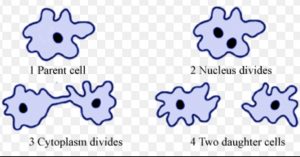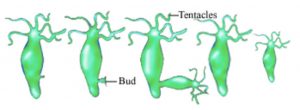Question 1 What is asexual reproduction?
Question 2 How does an amoeba reproduce?
Question 3 How does a hydra reproduce?
Question 4 Name 2 methods of asexual reproduction in animals?
Question 5 Name few animals which reproduce by asexual reproduction?
Question 6 Name one animal which reproduce by binary fission?
Question 7 Name one animal which reproduce by budding?
Asexual reproduction is the production of a new organism from a single parent without the involvement of sex cells or gametes.
The new organism produced by asexual reproduction is exactly identical to the parents.
The 2 common methods of asexual reproduction are:
(1) Binary Fission
(2) Budding
In the process of fission, the parent organism splits to form two or more new organism. Fission begins with the division of the nucleus followed by the division of the cytoplasm to form a new organism.
Binary Fission
In binary fission the parent organism splits or divides to form two new organism.
The unicellular organism called amoeba reproduces by the method of binary fission. Amoeba reproduces by binary fission by dividing its body into 2 parts. When the amoeba cell reached its maximum size of growth, then first nucleus of amoeba lengthens and divides into two parts. After that the cytoplasm of Amoeba divides into 2 parts, one part around each nucleus. One parent amoeba divides to form two smaller amoebae(Daughter amoebae).One amoeba produces two amoebae. It takes about an hour to divide into 2 daughter amoebae. The two daughter amoebae produced here grow to their full size by eating food and then divide again to produce four amoebae, and so on. The daughter amoebae produced by the process are identical to the parent amoeba.
Paramecium also reproduces by the binary fission. In multiple fission, parent organism splits to from many new organism at the same time.
Budding
Bud means a small outgrowth from the body of an organism. When a bud is formed on the body of an organism, then the nucleus divides into two and one of the nuclei passes into the bud.
In budding, a small part of the body of the parent organism grows out as a bud which then detaches and becomes a new organism.
For Example: Hydra, sea-anemones, sponges and corals reproduce by the method of budding.
In hydra, first a small outgrowth called bud is formed on the side of its body by the repeated divisions of its cells. This bud then grows gradually to form a small hydra by developing a mouth and tentacles. And finally the tiny new hydra detaches itself from the body of parent hydra and lives as a separate organism. The parent hydra has produced a new hydra. The bud formed in a hydra is not a single cell. It is a group of cells.


Very helpful
very helpful it helped me to do my project
yes it also helped me to do my project